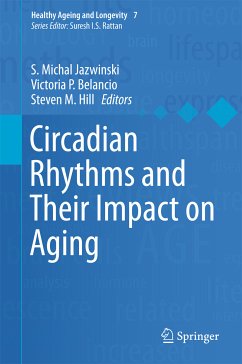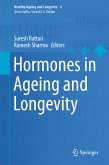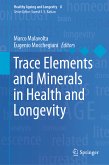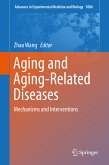This book examines the role of circadian rhythms in aging, an emerging area of biology. Although implicated in aging and longevity for over forty years, the richness of the ways in which the circadian system impacts aging has become evident only more recently. The circadian system consists of a central pacemaker and a multitude of peripheral clocks, located in most cells throughout the organism. These clocks keep metabolic, physiological, and behavioral patterns in tune with the twenty-four hour day/night cycle and with each other. Disruptions of the circadian system, such as the presence of light at night, can have profound pathological implications. The core circadian oscillator consists of a multicomponent transcriptional feedback loop that regulates the periodicity of expression of some ten percent of the genes in the human genome. This easily explains the broad influence of the circadian system.
The chapters in this volume fall into four sections that follow a brief introduction. They are written by experts performing the research in this field. The first section/chapter surveys the operation of the aging circadian system with a focus on melatonin signaling. In the second section, this theme is amplified through a discussion of the aging lung, bone, and gastrointestinal system. A section composed of eight chapters explores in detail cellular and molecular mechanisms associated with circadian system aging, in a range of experimental models. The studies reviewed include genetic, epigenetic, molecular, cell biological, metabolic, and physiologic approaches. The final section details the effects of sleep disruption on mortality risk in older adults and the effects of physical activity on circadian rhythms in the elderly, adding to the earlier discussion of the potential of chronotherapeutics.
Advanced undergraduates and graduate students will find this book both a suitable introduction and a definitive treatment ofthe impact of circadian rhythms on aging. Instructors and researchers in circadian biology and in aging biology will discover this to be a valuable reference work, which brings these fields into juxtaposition and merger. This volume will contribute to further advances in this important interdisciplinary area.
The chapters in this volume fall into four sections that follow a brief introduction. They are written by experts performing the research in this field. The first section/chapter surveys the operation of the aging circadian system with a focus on melatonin signaling. In the second section, this theme is amplified through a discussion of the aging lung, bone, and gastrointestinal system. A section composed of eight chapters explores in detail cellular and molecular mechanisms associated with circadian system aging, in a range of experimental models. The studies reviewed include genetic, epigenetic, molecular, cell biological, metabolic, and physiologic approaches. The final section details the effects of sleep disruption on mortality risk in older adults and the effects of physical activity on circadian rhythms in the elderly, adding to the earlier discussion of the potential of chronotherapeutics.
Advanced undergraduates and graduate students will find this book both a suitable introduction and a definitive treatment ofthe impact of circadian rhythms on aging. Instructors and researchers in circadian biology and in aging biology will discover this to be a valuable reference work, which brings these fields into juxtaposition and merger. This volume will contribute to further advances in this important interdisciplinary area.
Dieser Download kann aus rechtlichen Gründen nur mit Rechnungsadresse in A, B, BG, CY, CZ, D, DK, EW, E, FIN, F, GR, HR, H, IRL, I, LT, L, LR, M, NL, PL, P, R, S, SLO, SK ausgeliefert werden.









